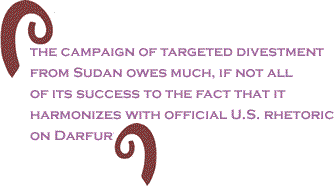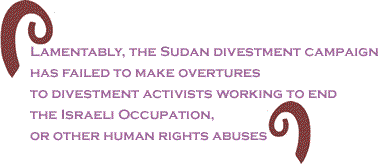
|
|||||||||||||||||||||
|
||||||||||
|
||||||||||
The current issue is always free to everyone If
you need the access available to a |
||||||||||
 |
||||||||||
 |
||||||||||
|
Note: The Editor of this article was Saif Rahman Evoking memories of global activism against apartheid in South Africa, the Save Darfur movement is aiming to address the humanitarian crisis in the beleaguered region by campaigning for divestment from certain companies operating in Sudan. Though there are ample grounds for criticizing other stances taken (or not taken) by many in the Save Darfur movement - such as support for a no-fly zone, or the general failure to put substantial pressure on Washington to adequately fund the African Union (AU) forces on the ground in Darfur - the focus on divestment is not in and of itself objectionable, and to the extent it can aid efforts to stop the atrocities, it should certainly be pursued. However, it is important to understand the limitations and potential pitfalls of such advocacy, as well as the political context that has allowed divestment from Sudan to progress in ways that divestment from other human rights abusers has not. As explained by the academic Eric Reeves, who has written extensively on Darfur, the goals of the movement are as follows: The divestment campaign targets those companies that list on the New York Stock Exchange and other U.S. exchanges which provide key commercial and capital investments in the economy of Sudan, supporting the National Islamic Front, National Congress Party regime in Khartoum, and insulating them from the consequences of their massive external debt and their profligate expenditures on military weapons and the prosecution of genocidal war in Darfur. Note that this is divestment from companies "that list on...U.S. exchanges" - it is not divestment from U.S. companies operating in Sudan, since they are already prohibited from doing so by U.S. sanctions. Accordingly, the divestment campaign is targeting foreign (mostly Asian) firms, most prominently oil companies such as PetroChina. While urging individual and corporate investors in the U.S. to sell their holdings in foreign companies because of their links to human rights abuses in Sudan is laudable in principle, it is also, at the very least, convoluted. One issue is simply the practicality of such an aim; in light of the extended degrees of separation of influence between perpetrators and activists, it is not obvious the campaign can be effective. While divestment from South Africa is often cited as a precursor to this divestment movement, it is in reality a poor basis for comparison in this regard, as U.S. companies operated in South Africa without legal impediment for most of the duration of the U.S.-allied apartheid regime, and thus were directly susceptible to pressure from U.S. activists. As noted, this is not the case with Sudan, and the added layer of complexity may render this campaign a waste of time and energy that could be applied to helping the people of Darfur in a more concrete fashion.
Yet even if the campaign were successful in forcing total U.S. divestment from foreign oil companies operating in Sudan, it is not clear how much pressure these firms would actually feel to pull out of the country, especially since some of them, such as PetroChina, are state-backed. There is, to be sure, no shortage of businesses or governments willing to invest in oil-producing countries without any consideration for human rights (as the U.S. does in Equatorial Guinea, "among the world's worst" dictatorships), and thus any ostensible success in the divestment movement may simply lead to a shuffling of the line-up of investors rather than meaningful pressure on Khartoum. Just as fundamentally, pursuing a divestment strategy fails to take into account that the Save Darfur movement has far greater leverage vis-à-vis the U.S. government, for whose policies U.S. activists bear direct moral responsibility. As an elementary statement of principle, activists concerned with improving the world will focus their efforts where they can most effectively influence change, generally the policies of their own governments. Yet Darfur activists have largely failed to pressure Washington to take basic steps - beyond ultimately meaningless rhetorical grandstanding - to improve the situation on the ground in Darfur, such as funding AU troops, "many of whom have not been paid for months." Nevertheless, the Save Darfur Coalition clings to its curious official posture that Washington is doing "good work" in resolving the crisis, evidence for which has not been forthcoming, as it does not exist. In no small part because it largely frees domestic elites of moral culpability by focusing instead on China's role in perpetuating the crisis in Darfur - which is significant, though again, less subject to pressure from U.S. activists than Washington's own cynical policies - this divestment movement has gained significant ground in a relatively short period of time. Across the U.S., states, major cities, presidential candidates, and dozens of universities have moved to discuss and/or implement varying levels of divestment from companies with Sudan operations, as well as U.S.-based firms such as Berkshire Hathaway and Fidelity Investments which hold stock in such businesses.
Yet if divestment is a valid tactic for effecting change in a country which seriously violates human rights - that is, if divestment is supported by the victims of the abuses, and can be "targeted" in such a way that it does not have adverse affects on the general population - then where is the rush to divest from Israel's "war crimes"? The contradiction is explicit in the case of Harvard University. In 2002, in response to a petition to divest the university from the Israeli Occupation, then Harvard President Lawrence Summers condemned the campaign as "anti-Semitic in effect, if not intent." Yet in April 2005, Harvard became "the first major victory in a national campaign for divestment from Sudan" as it divested from PetroChina. As Summers commented, Divestment is not a step that Harvard takes lightly, but I believe there is a compelling case for action in these special circumstances, in light of the terrible situation still unfolding in Darfur and the leading role played by PetroChina's parent company in the Sudanese oil industry, which is so important to the Sudanese regime. Employing his own perverse logic, why is this campaign not anti-Chinese, anti-African, or anti-Muslim? As the Harvard law professor Alan Dershowitz asks about those advocating divestment from the Israeli Occupation, Why don't they say anything about Cuba's chilling of dissent or China's occupation of Tibet? Why don't they feel a personal stake in getting Jordan, Egypt, and the Philippines to stop torturing people? ... The only reason they feel so strongly about Israel is because it is the Jewish nation. Yet it would be unimaginable for a figure even as crass as Dershowitz to openly condemn Darfur activists for bigotry and failing to "say anything about Cuba." Instead, Darfur activism receives extensive and favorable coverage in the mainstream media, while the voices of opponents of U.S.-Israeli policies vis-à-vis the Palestinians are marginalized and ridiculed, if they are heard at all. Accordingly, the campaign of targeted divestment from Sudan owes much, if not all of its success to the fact that it harmonizes with official U.S. rhetoric on Darfur. Divesting from Israel's human rights abuses, substantial as they are, does not accord with establishment prerogatives, and thus the campaign to divest - though longer running - has failed to resonate in the tender hearts of city legislators, state government officials, or the Lawrence Summers of the world (evidently, no small category). Nor is the mainstream press chomping at the bit to take concrete steps to end the war in Iraq, a humanitarian crisis of immense proportions with a death toll that dwarfs that of Darfur, and one that the U.S. public more directly has the power to halt. It is because the war in Iraq is of our making that antiwar activism has failed to resonate in the media, while officialdom has nurtured the flourishing Save Darfur movement. That the campaign to divest from the Israeli Occupation has failed to gain Darfur-like traction, while we bear a much more direct moral responsibility for Israel's actions - which the U.S. government could likely halt almost immediately - makes the reasons for the relative success of the Sudan divestment campaign clear enough. Lamentably, the Sudan divestment campaign has failed to make overtures to divestment activists working to end the Israeli Occupation, or other human rights abuses.
That the Save Darfur movement is, in the eyes of its leaders, the "biggest such activism" since Vietnam - instead of the movement to end the war in Iraq, which, again, is a crime of Washington's making - is perhaps an even clearer indication of the failures in our intellectual culture. Kevin Funk and Steve Fake are social justice activists who are currently writing a book about Darfur. They maintain a blog with their commentary called Confronting Empire. Additionally, they are contributors to Foreign Policy In Focus. Click here to contact the authors. |
||||||||||
| October
11,
2007 Issue 248 |
|
| Printer Friendly Version in resizeable plain text format format |
 |
 |
 |
| |
| |



































